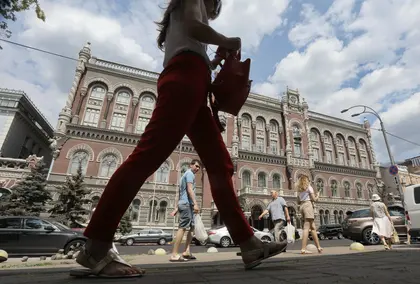The National Bank of Ukraine this week continued to cut the policy rate while trying to buffer the hryvnia from coronavirus panic.
NBU governor Yakiv Smolii said that the interest rate cut, from 11% to 10%, is meant to deal with lower than expected consumer inflation. The move is a continuation of the NBU’s monetary policy, which saw the regulator reduce the rate from 13.5% to 11% at the end of January. Last year, the NBU cut the rate five times, from 18%.
The central bank reported that consumer inflation slowed to 3.2% year over year in January and 2.4% year over year in February, well below the NBU’s January projection of 4.8%.
“As a result, inflation is currently below the NBU’s medium-term target of 5% that is the level optimal for the development of the Ukrainian economy,” Smolii said in a statement on March 12.
According to the bank, last year’s strong hryvnia affected the prices of goods, especially imports. Additionally, raw food supplies increased and global energy prices fell, contributing to the low inflation rate.
These factors offset the effect of strong consumer demand amid continued growth in real household income, the bank wrote. Growth in real wages accelerated to 12.5% in January, and growth rates of retail turnover continue to exceed 12%, according to the NBU.
Investment firm Concorde Capital questioned the wisdom of the rate reduction, writing in its March 13 newsletter that the bank “wasn’t convincing” when stating that monetary softening will maintain economic growth in the current atmosphere of uncertainty.
“We believe that recent negative developments at the global markets, and grueling situation at Ukraine’s forex, are sufficient factors for suspending monetary softening, or even tightening policy,” wrote Concorde analyst Evgenia Akhtyrko. “In addition, the NBU preferred to play down the growing uncertainty regarding Ukraine’s deal with the IMF.”
The regulator aims to bring the rate down to 7% by the end of the year but the plan will depend on Ukraine being able to cooperate with the International Monetary Fund.
Many analysts doubt the likelihood of this cooperation, following President Volodymyr Zelensky’s eyebrow-raising cabinet reshuffle on March 4.
“One of the possible explanations of the NBU’s stubborn adherence to its plans to lower the key rate is political pressure from the Ukrainian president,” Akhtyrko wrote.
Limited COVID-19 impact
Smolii sought to tamp down coronavirus fears, saying that the pandemic has had a “limited or neutral” effect on the country’s economy.
“Ukraine’s exports continue to rise,” Smolii stated. “Further increases in physical volumes of exports have more than offset certain declines in prices for some of the goods the country exports.”
“At the same time, import prices (especially energy prices) are declining even faster than export prices,” he said. “The price environment on the crude oil market has been favorable for Ukraine even disregarding the latest developments.”
According to the central bank, crude oil prices fell by 10-15% year-over-year in February. European prices for natural gas plummeted by 50% and prices of metals dropped by about 11-12%. Grain and iron ore prices were almost unchanged.
“Apart from the drop in global prices caused by the coronavirus, disinflation in Ukraine will be driven by the recent rise in competition between crude oil producers,” Smolii said. “This will keep energy prices at record lows, which will also impact prices for Ukrainian exports.”
The NBU plans to revise its macroeconomic forecast in April when the consequences of the pandemic become clearer. The biggest factors include the cooling of the global economy, a downward pressure on prices, monetary easing by central banks of Ukraine’s trading partners, and measures to halt the spread of COVID-19.
Forex frenzy
The global spread of COVID-19 struck fear into financial and commodity markets and introduced turmoil into Ukraine’s foreign exchange market, according to the NBU. This led to a soaring demand for foreign currency, which exceeded the supply, starting last week.
After an unusually strong showing throughout much of 2019, the hryvnia began to plummet in value. The currency fell to Hr 25.85 against $1 as of March 13.
The central bank has been trying to smooth out the fluctuations via large-scale forex sales, which reached $700 million this week alone. The central bank said it’s ready to conduct more forex interventions if necessary.
“Despite the fact that the psychological factor is the only reason for the FX market turmoil, it poses a risk of a deterioration in inflation expectations, which can later affect consumer prices,” Smolii said.
Banking executives told the Kyiv Post that the central bank does not plan to introduce foreign currency exchange limits, and that its current reserves are enough to smooth currency rate fluctuations amid the market turmoil.
Countries hit by the coronavirus epidemic have tried to implement largely futile measures to try to rally their markets and reassure investors, according to experts.
You can also highlight the text and press Ctrl + Enter







Comments (0)